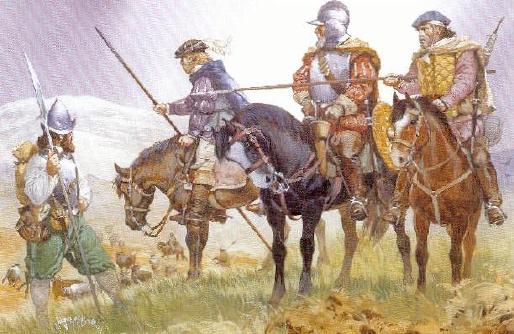Who were the 'Border Reivers?'
‘Reive’ is an early English word meaning "to rob",
Border Reivers were raiders along the Anglo–Scottish border from the late 13th century to the beginning of the 17th century. During this time, England and Scotland were frequently at war and the area was lawless, godless and often decimated by opposing armies.
A tough area breeds tough people. The families who lived there – on both sides of the border – grouped together in clans for protection and survival. Loyalty to a feeble or distant monarch or reliance on the effectiveness of the law, were not good survival strategies for the people of the borders. Instead, they sought security through their own strength and cunning and set out in large mobs to raid other families. ‘Reiving’ - raiding for cattle and sheep (and whatever else which could be transported) was the only way to survive and it became an established way of life, a profession, which was regarded with no discredit amongst the Borderers. The Reivers moved only at night, taking advantage of their intimate knowledge of the remote and rugged terrain, to spirit away their ill-gotten plunder.
Their heyday was perhaps in the last hundred years of their existence, during the time of the Stuart Kings in Scotland and the Tudor Dynasty in England.
The attitudes of the English and Scottish governments towards the border clans alternated between indulgence and encouragement. Secure in their rule in the majority of the two countries, the authorities in England and Scotland were happy to let the Reivers battle it out for supremacy in the narrow hill country between the two nations. These fierce families served as the first line of defence against invasion and it suited authorities to have gangs of outlaws harassing the enemy on the border. However, the royalty of both countries would only travel through the region with a large and heavily armed escort. Even they were afraid of the Reivers.
As soldiers, the Border Reivers were considered among the finest light cavalry in all of Europe; they were outstanding horsemen. Living on the frontier between two warring nations sharpened their soldiering skills. Many worked as mercenaries abroad.
Of course, the notion of Scottish Clans is now legendary around the world – mostly thanks to Sir Walter Scott and his ballads. What is not so well known, perhaps, is that on the English side of the border there were also large, unruly English clans like the Charltons, the Armstrongs, the Milburns, the Robsons, the Fenwicks and the Dodds.

 RSS Feed
RSS Feed